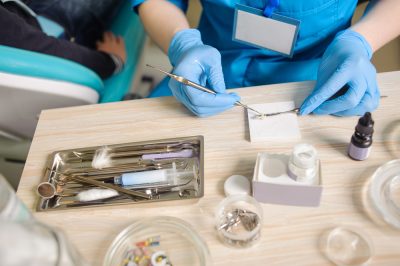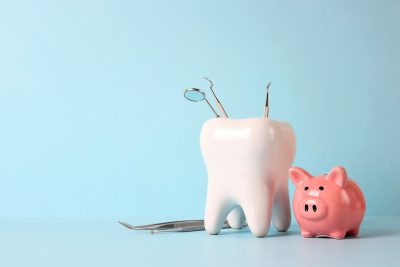Revolutionizing Dental Restoration: The Glass Ionomer Advantage
Are you searching for a dental filling solution that combines cutting-edge technology with gentle, effective treatment? Modern dentistry offers numerous options for restoring dental health, but glass ionomer fillings stand out as a remarkable innovation that goes beyond traditional approaches. These sophisticated restorations represent more than just a way to fill a cavity – they’re a proactive method of dental care that releases fluoride, bonds chemically to the tooth structure, and provides a natural-looking solution for those seeking comprehensive oral health management.
Learn more about glass ionomer fillings by reading the helpful guide provided by Gulf Gate Dental’s Sarasota dentists. To explore the comprehensive filling options available at our Greater Tampa Bay Area dental practice, call (941) 921-2122.
What Are Glass Ionomer Fillings?
Glass ionomer fillings represent a sophisticated dental restoration technique that combines cutting-edge materials science with precision dental care. Crafted from a unique blend of glass powder and an organic acid like polyacrylic acid, these innovative fillings offer a remarkable ability to chemically bond directly to the tooth structure. This advanced bonding mechanism provides a seal that goes beyond traditional filling methods, creating a more integrated dental restoration.
Types of Glass Ionomer Fillings
Our dental practice offers several advanced glass ionomer filling variations:
- Conventional Glass Ionomer: A time-tested solution utilizing self-curing technology, conventional glass ionomer fillings are ideal for addressing small to medium-sized cavities with proven effectiveness.
- Resin-Modified Glass Ionomer: An enhanced hybrid material that combines traditional glass ionomer benefits with modern resin-based technologies, offering improved strength and aesthetic appeal.
- Compomer (Composite-Glass Ionomer Hybrid): A cutting-edge solution that bridges the gap between composite fillings and glass ionomers, providing superior aesthetic results and versatile application.
Glass Ionomer Fillings Uses
Our dentists may recommend glass ionomer fillings for various dental scenarios:
- Small to Medium-Sized Cavities: Glass ionomer cement provides precision restoration for both adult and pediatric patients.
- Root Surface Cavities: Glass ionomer dental fillings are an effective treatment for areas exposed to gum recession.
- Pediatric Dentistry: Glass ionomer cement is an optimal solution with fluoride-releasing properties.
- Non-Stress-Bearing Areas: Glass ionomer cement is ideal for front teeth and select premolar restorations.
Advantages and Disadvantages of Glass Ionomer Fillings
Advantages and Disadvantages of Glass Ionomer Fillings
Advantages
- Natural, Translucent Appearance: Glass ionomer fillings closely mimic the natural color and translucency of teeth, providing a more aesthetically pleasing result. This makes them an excellent choice for visible areas of the mouth where a natural look is desired.
- Active Fluoride Release: One of the most significant benefits of glass ionomer fillings is their ability to release fluoride over time. This continuous fluoride release helps to prevent further decay around the filling and in adjacent teeth, offering ongoing protection against cavities.
- Minimally Invasive Tooth Preparation: Glass ionomer fillings require less removal of healthy tooth structure compared to some other filling materials. This conservative approach helps preserve more of the natural tooth, which is beneficial for long-term dental health.
- Excellent Biocompatibility: These fillings are highly compatible with human tissue, reducing the risk of adverse reactions. The materials used in glass ionomer fillings are well-tolerated by the body, making them a safe option for most patients.
- Tissue-friendly Restoration Method: The application process for glass ionomer fillings is gentle on the surrounding gum tissue. This characteristic makes them particularly suitable for use in areas near or below the gum line, such as in cases of root surface cavities.
Disadvantages
- Limited Durability: Compared to some alternative filling materials, such as composite resin or amalgam, glass ionomer fillings may have a shorter lifespan. They are generally less resistant to wear and tear, which can lead to more frequent replacements, especially in high-stress areas of the mouth.
- Moisture Sensitivity During Application: The placement of glass ionomer fillings requires a carefully controlled environment. These fillings are particularly sensitive to moisture during the application process, which can affect their strength and longevity if not managed properly.
- Reduced Strength: Glass ionomer fillings are typically not as strong as some other filling materials. This reduced strength makes them less suitable for areas of the mouth that endure high biting forces, such as the molars in adults.
- Aesthetic Limitations in Highly Visible Areas: While glass ionomer fillings offer a natural appearance, they may not provide the same level of aesthetics as composite fillings, especially in highly visible areas of the mouth. For front teeth or areas where appearance is crucial, other options might be preferred.
- Potential For Early Wear: Due to their softer nature compared to other filling materials, glass ionomer fillings may wear down more quickly. This can lead to a need for more frequent dental check-ups and potential replacements, especially in patients with habits like teeth grinding.
The Glass Ionomer Filling Procedure
Initial Examination and Diagnosis
Dr. Ryan conducts a thorough dental examination. A personalized diagnostic assessment is performed to determine the extent of the tooth decay and suitability for a glass ionomer filling. X-rays may be taken if necessary to get a complete picture of the affected tooth.
Tooth Preparation
Local anesthesia is administered to ensure patient comfort. Decayed portions of the tooth are carefully removed using specialized dental instruments. Then, the cavity is shaped to create an ideal foundation for the glass ionomer filling.
Material Preparation and Application
The glass ionomer material is expertly mixed according to manufacturer specifications. Next, the prepared cavity is cleaned and dried to ensure proper adhesion. The mixed glass ionomer material is carefully applied to the prepared cavity. Optional light curing may be performed to enhance the structural integrity of the filling.
Shaping and Polishing
The filling is shaped to match the natural contours of the tooth. Any excess material is removed to ensure a proper fit. The filling is polished to create a smooth surface and natural appearance.
Post-Procedure Care Instructions
Detailed guidance on oral hygiene practices is provided to the patient. Necessary dietary considerations are explained to protect the new filling. Instructions on what to expect in the days following the procedure are given.
Follow-up Appointments
Strategic follow-up appointments are scheduled to monitor the filling’s performance. These appointments allow for early detection and address any potential issues. Ongoing dental health maintenance is discussed during these follow-ups.
Costs of Glass Ionomer Fillings
Patients can anticipate investment ranges between $75 to $200 per glass ionomer filling. Pricing for glass ionomer fillings varies based on cavity complexity, location, and individual insurance coverage. Our team works diligently to provide transparent cost information and maximize your dental care value.
Factors Influencing Cost
- Cavity Size: Larger cavities require more material and time to fill, increasing the cost.
- Tooth Location: Fillings in hard-to-reach areas of the mouth may be more expensive due to the increased difficulty of placement.
- Complexity of the Procedure: If additional work is required, such as removing an old filling or treating deep tooth decay, the cost may increase.
Insurance Considerations
Many dental insurance plans cover glass ionomer fillings, often at a rate of 50 percent to 80 percent of the total cost. Coverage can vary significantly between plans, so it’s important to check with your insurance provider. Some plans may have waiting periods or annual maximums that could affect coverage.
Geographic Variations
Costs can vary depending on the location of the dental practice. Urban areas and regions with a higher cost of living may have higher prices for dental procedures.
Dentist’s Experience and Expertise
More experienced dentists or those with specialized training may charge higher fees. However, their expertise can often result in better long-term outcomes.
Additional Costs to Consider
Initial consultation and X-rays may incur separate charges. Follow-up appointments to check the filling’s condition might be necessary.
Value Considerations
While not the cheapest option, glass ionomer fillings offer benefits like fluoride release and chemical bonding to the tooth, which can provide good value over time. Their ability to help prevent further tooth decay can potentially save on future dental costs.
Our dental team is committed to providing transparent pricing information and helping patients understand their options. We work diligently to maximize the value of your dental care investment and can discuss payment plans or financing options if needed.
Frequently Asked Questions
Glass ionomer fillings typically last between five to ten years, although their longevity can vary based on several factors. Key influences include the patient’s oral hygiene practices, the location of the filling within the mouth, and the specific characteristics of the glass ionomer material used. Regular dental check-ups can help monitor the condition of the fillings and ensure they remain functional.
Yes, glass ionomer fillings are considered very safe for dental use. They are biocompatible, meaning they are well-tolerated by the body and unlikely to cause allergic reactions. Additionally, these fillings actively support dental health by releasing fluoride, which helps prevent further tooth decay and promotes overall oral wellness.
Learn More About your Filling Options, Call Gulf Gate Dental!
Ready to transform your dental health? Our team serves Sarasota and surrounding areas including Fruitville, Bradenton, and South Sarasota. Dr. Michael P. Ryan and Dr. Collin S. Ryan are prepared to provide personalized dental solutions tailored to your unique needs. Schedule your comprehensive consultation by contacting Gulf Gate Dental, call us at (941) 921-2122 – your smile deserves expert care!



